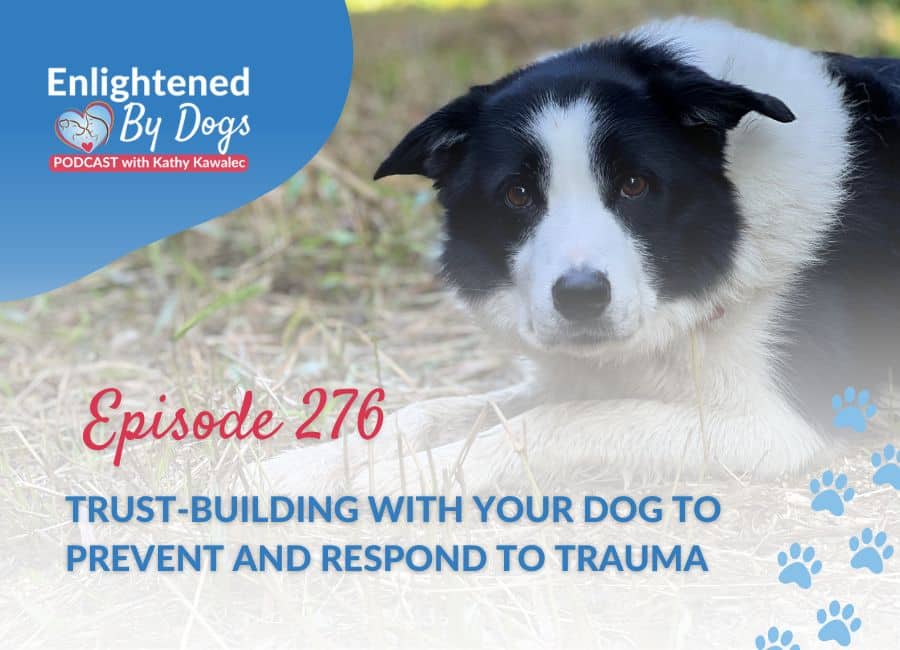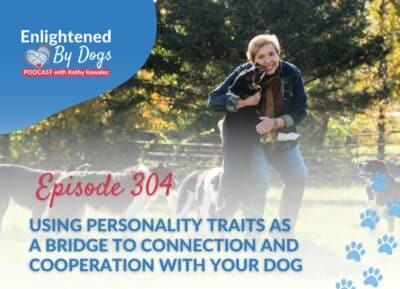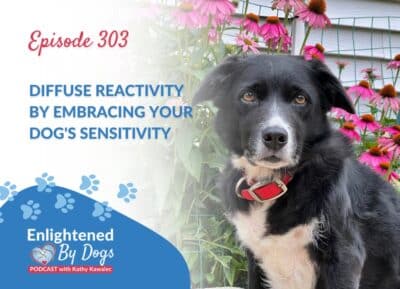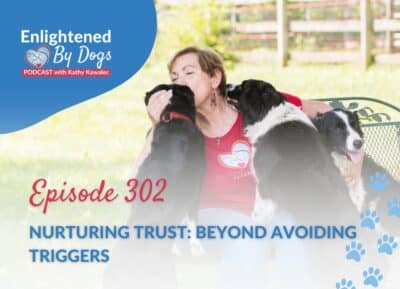
In today’s episode, we look at the world of natural communication and connection with our canine companions. Think back to when you first brought your pup home, that initial bond, the trust, and the love that started to flourish. However, as life happens, unpredictable and potentially traumatic events can strain that bond. So, how do we foster a relationship that ensures our dogs look to us as trustworthy during these scary experiences?
Reflecting on the nature of dogs, puppies naturally gravitate towards their mother and littermates. It’s instinctual. They seek warmth, protection, and food. As dog moms, we can and should continue to nurture this instinct, ensuring our dogs always feel that safety with us.
Instead of focusing on traditional trained commands that might inadvertently teach our dogs to NOT seek us out, it’s about embracing a different approach. Let’s teach through understanding, patience, role modeling, and true connection, much like how we’d guide a toddler.
But what if a traumatic event occurs? Say, an unleashed dog approaches fast and hard, scaring our dog on a walk, or a sudden loud thunderstorm triggers panic or anxiety. The key takeaway is that OUR behavior during and after the traumatic event can profoundly affect recovery and the long-term effect. Guiding our dogs confidently and calmly back to safety and being their pillar of strength and comfort will foster even deeper trust.
In Kathy’s shared stories of her dogs Dallas and Luc, we learn how staying calm, being present, and offering refuge can turn traumatic instances into trust-building experiences. Much like how Dallas learned to seek comfort during loud noises, or Luc’s heartwarming natural attraction towards safety and love, our canine companions will easily learn they can always find solace in us.
3 Key Takeaways From This Episode:
- The natural instincts of dogs lean towards seeking comfort, warmth, and protection from us. Embrace and nurture this instinct rather than suppressing it with obedience and training.
- Our behavior during and after traumatic events can profoundly influence how our dogs recover and perceive similar future events.
- Proactively positioning ourselves as pillars of trust and safety, especially in situations that trigger reactivity or fear, can build a stronger, more resilient bond with our dogs.
Memorable Quotes:
“We want to demonstrate to our dogs that they can trust us by simply tapping into what’s already natural to us and to our dogs.”
“We can teach our puppies to move toward us for comfort and love and protection and all the things that meet their needs for thriving, including unconditional love, a strong feeling of belonging, and feeling safe.”
“Those traumatic events, like the loud, scary thunder or fireworks that frightened my border collie, Dallas, resulted in even more trust between us. From our shared experiences, she learned to come to me for safety and comfort. Over time, she no longer panicked but looked to me for reassurance.”
“How we behave during and after a traumatic event is more important than what actually happened during the traumatic event. It’s the natural way that humans and dogs, as social animals, stay connected and seek connection.”
“In times of potential danger, think of it as ‘getting back to grazing.’ Just as a matriarch in a herd would calmly role model to just start eating again after an alarm, we too should aim to restore a sense of calm and safety after an unexpected or unwanted incident.”
LOVE TO LEARN MORE?
Become a calm and confident Dog Mom with a cooperative, happy dog … without obedience training, relying on treats or arousing games, or corrections of any type.
Here are some next steps:
- GET STARTED – Work with Kathy:
https://dancinghearts.link/foundation - SUBSCRIBE to Kathy’s YouTube Channel:
https://www.youtube.com/c/DancingHeartsDogAcademy/videos - LISTEN or READ Kathy’s Podcast and Blog on her Website:
https://dancingheartsdogacademy.com/ - LET’S CONNECT on the socials for more partnership tips:
Facebook: https://www.facebook.com/dancinghearts/
Instagram: https://www.instagram.com/kathykawalec/ - LISTEN TO PODCASTS:
Subscribe to the Enlightened By Dogs podcast in your favorite app! Don’t forget to leave us a rating and review – it would make Kathy very happy! - Subscribe on Apple Podcasts | Listen on Spotify





One Response
Really interesting and helpful advice. I have a rehomed dog who reacts to noises and people by barking seemingly aggressively and I have been trying to reasure him calmly
that everything was altight etc. Other people do not agree with me and believe I should “tell him firmly” to be quiet etc.
I know he trusts me and will come to me although he is still reactive. people wonder why I am not taking him to obediance classes but I don’t really care if he “sits; down ; stays” etc as long as he is safe and happy though it would be wonderful if I could help him not to be reactive